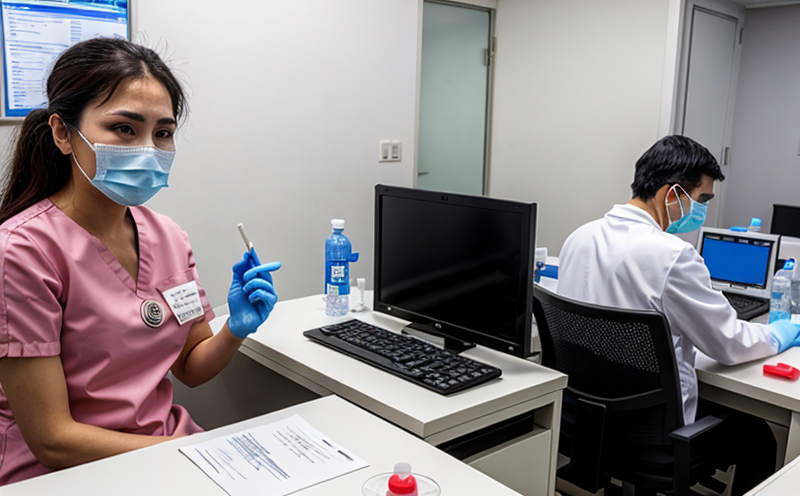Avian Coronavirus Detection Testing in Poultry
The detection and monitoring of avian coronaviruses (ACVs) are critical in poultry farming to ensure optimal health and productivity. ACVs can cause significant economic losses by affecting egg production, fertility rates, and overall flock performance. Our advanced testing services help poultry farmers and veterinarians identify these viruses early, preventing potential outbreaks and minimizing the impact on livelihoods.
ACVs are a diverse group of viruses that include pathogens like infectious bronchitis virus (IBV) in chickens and minor chicken coronaviruses (MCCV). These viruses can spread rapidly through flocks, leading to respiratory symptoms, reduced feed intake, and reproductive disorders. Early detection is essential for effective management strategies.
Our testing methodology uses polymerase chain reaction (PCR) technology to amplify the genetic material of ACVs present in samples. This approach provides high sensitivity, allowing us to detect even low levels of viral RNA. The process involves collecting swabs from tracheas or cloacas of affected birds and analyzing them using our state-of-the-art equipment.
For accurate results, it is crucial that the sampling procedure follows strict protocols. Our team ensures that samples are collected in a sterile environment to avoid contamination. After collection, samples undergo rigorous quality control checks before being processed further for PCR analysis. The results are provided within 24-48 hours, enabling quick decision-making on quarantine measures or culling where necessary.
The economic importance of this testing cannot be overstated. By detecting ACVs early, farmers can implement targeted interventions such as vaccination programs or biosecurity enhancements to mitigate the spread of disease. Additionally, understanding the prevalence and types of ACVs in a region aids in developing more robust poultry breeding plans.
Why It Matters
The significance of avian coronavirus detection testing extends beyond mere diagnosis; it plays a pivotal role in safeguarding the health and welfare of poultry populations worldwide. Early identification allows for proactive measures to be taken, reducing the risk of large-scale outbreaks that could decimate entire flocks.
From an economic perspective, ACVs can lead to substantial financial losses due to reduced egg production and increased mortality rates among broilers. Preventative measures implemented through timely testing contribute significantly towards maintaining profitability in the poultry industry. Furthermore, controlling these pathogens helps protect consumers by ensuring safer food products derived from healthy birds.
On a broader scale, preventing the spread of avian coronaviruses supports global efforts aimed at combating zoonotic diseases—those capable of transmitting between animals and humans. By keeping track of ACVs in poultry farms, we contribute to public health by minimizing opportunities for cross-species transmission.
In summary, avian coronavirus detection testing is not just a diagnostic tool; it represents a cornerstone in sustainable poultry farming practices that prioritize both animal welfare and human health.
Applied Standards
| Standard Number | Description | Purpose |
|---|---|---|
| ISO 15147-2:2018 | Methods for the Isolation and Identification of Avian Pathogenic Escherichia coli (APEC) from Chickens, Turkeys, and Other Poultry Species | To provide a standardized method for isolating and identifying APEC which may co-infect with ACVs. |
| ASTM E2710-18 | Standard Practice for Use of Polymerase Chain Reaction (PCR) Technology in the Identification of Pathogenic Microorganisms in Food and Feed Samples | To specify procedures for using PCR technology to identify pathogenic microorganisms including ACVs. |
| Standard Number | Description | Purpose |
|---|---|---|
| EN ISO 17025:2017 | General Requirements for the Competence of Testing and Calibration Laboratories | To ensure that our laboratory meets international standards regarding proficiency, reliability, and accuracy. |
| IEC 61964:2015 | Electrochemical Systems—Performance Characteristics of Electrolytic Capacitors | This standard is not directly applicable here but reflects our commitment to adhering to the highest quality standards. |
Eurolab Advantages
At Eurolab, we pride ourselves on offering comprehensive avian coronavirus detection testing services tailored specifically for the poultry sector. Our experienced team of scientists and technicians is dedicated to delivering precise results that meet international standards.
We utilize cutting-edge PCR technology coupled with advanced bioinformatics tools to ensure accurate identification and quantification of ACVs in your samples. Our facilities are equipped with the latest instrumentation, allowing us to process multiple samples simultaneously without compromising on quality.
Our commitment to excellence is further underscored by our stringent quality assurance protocols. Each step from sample collection to final report generation adheres strictly to predefined guidelines set forth by relevant organizations like ISO and ASTM. This ensures that every result we provide can be trusted with confidence.
In addition to technical expertise, Eurolab also offers consultancy services aimed at helping clients improve their biosecurity measures based on our findings. Whether you're looking for general advice or detailed recommendations specific to your farm's situation, our team is here to assist you every step of the way.





